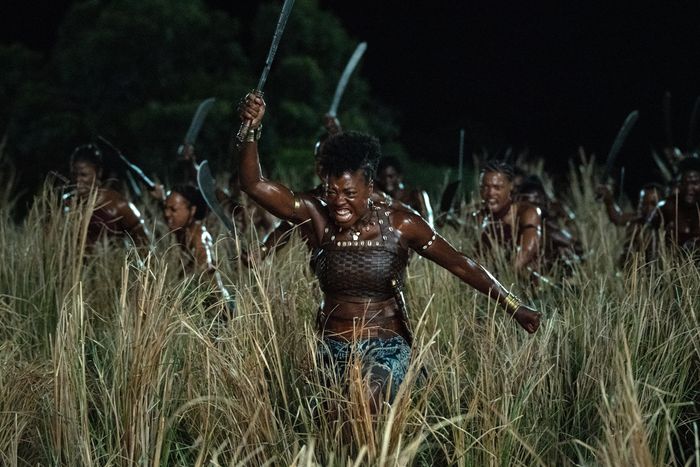
The Agojie have long captured the imagination of pop culture — understandably. Who could resist the idea of an all-female regiment, tough and formidable, fighting on behalf of the West African kingdom of Dahomey for three centuries? The Agojie, or variations on them, have turned up in novels, plays, and video games, in a Werner Herzog movie and the TV series Lovecraft Country, and, most notably, as an inspiration for the Dora Milaje in Black Panther, those imposing and also wildly cool guardians of the fictional country of Wakanda. They lend themselves especially well to an Afrofuturist vision, these warriors seemingly out of time, or at least in defiance of time’s tendency to bend toward patriarchy. Even The Woman King, Gina Prince-Bythewood’s rousing new period epic set in the 19th century, can’t help but amend the record in a wistfully Tarantinoesque act of alternate history. Its version of the Agojie, led by a brawny Viola Davis as General Nanisca, take up arms not just against the rival Oyo Empire and the Mahi people they’re aligned with, but against the Europeans who have been buying captives from all of them and finally against the slave trade itself.
The Woman King, which was written by Dana Stevens (of Safe Haven and Fatherhood), based on an idea that Maria Bello pitched to Davis at an awards ceremony, can be forgiven for taking the same sort of liberties with history that crowd-pleasers like Braveheart and Gladiator did to considerable acclaim over two decades ago. That’s the moment of Hollywood hitmaking it hearkens back to, when costume-drama sensibilities were combined with a contemporary approach to bloodshed. The Woman King introduces its characters in merciless array, with Nanisca, flanked by her soldiers, rising out of the brush at night and rushing with bruising force at a group of Mahi men who have taken Dahomey prisoners. Lashana Lynch runs away with the movie as the swaggering Izogie, establishing herself as a standout early on for the zest with which she jabs the carefully sharpened nails on her index and middle fingers into an enemy’s eyeballs. Prince-Bythewood established her action bona fides with 2020’s immortal mercenary movie The Old Guard, and her battle sequences here are effective and unflashy, opting for an efficient ferocity that emphasizes these are seasoned warriors, not superheroes.
But The Woman King has as much palace intrigue and pulpy drama as it does martial set pieces, with a new recruit named Nawi (a winning Thuso Mbedu) who’s dumped at the king’s doors by a father furious at her refusal to marry the violent man he chose for her serving as an entry to the world of the Agojie, as well as a naïve counterpoint to Nanisca’s world weariness. There’s an interesting tension to the film whenever it makes its way past the inner walls of the royal sanctum, where the recently crowned King Ghezo (John Boyega) dwells amid his many wives, his women soldiers, and some eunuch courtiers. The Agojie enjoy an exceptional status in a society that’s nevertheless still dominated and run by men, and while the movie doesn’t entirely shy away from this fact — Nawi demands to know why the Agojie are not allowed to marry or have children while the men in the army are free to do both — it also feels too protective of its vibrant, not-yet-colonized kingdom to really contend with any of that.
Boyega plays Ghezo as a preening fuckboy-in-chief, and yet he’s called upon to be savvy as often as he is arrogant. He’s a participant in the slave trade and an enjoyer of its riches himself, but the movie stresses that he’s open to leaving it behind at Nanisca’s urging. Instead, it’s his favorite wife, Shante (Jayme Lawson), who bears the brunt of the movie’s sneering, as she schemes to raise her profile by encouraging him to stay the course and continue selling off captives to a Portuguese merchant named Santo Ferreira (Hero Fiennes Tiffin). The Woman King’s barely hidden desire for Dahomey to be more progressive, more open, and more revolutionary in its relationship to the atrocity of colonial slavery sometimes leaves the movie feeling like it’s tying itself in knots. The broader in theme it gets, the less convincing it is, and never more so than when it introduces a forbidden love interest for Nawi in the form of a biracial slaver named Malik (Jordan Bolger, all abs) who, over the course of what feels like minutes, connects to his Dahomey heritage and repudiates everything about the trade he’s been participating in.
The Woman King is strongest when it immerses itself in the dynamics and the personalities of the Agojie. That’s unsurprising given the strength of its cast, which also includes Sheila Atim as Amenza, Nanisca’s best friend and second-in-command. As Nanisca, Davis brings a melancholy to her character that’s more complicated than the movie around her aims to be. She’s fought for a place of power for herself, sacrificing everything and wearing her scars with pride, and yet she finds herself waking up at night in a panic, having been unable to fight her way into a feeling of security. The solidarity the Agojie enjoy crosses backgrounds and class lines and is carved out of grueling training regimens and bonding rituals. Together, theirs is an uncommon strength. And yet they still exist in service to the whims of a king.


